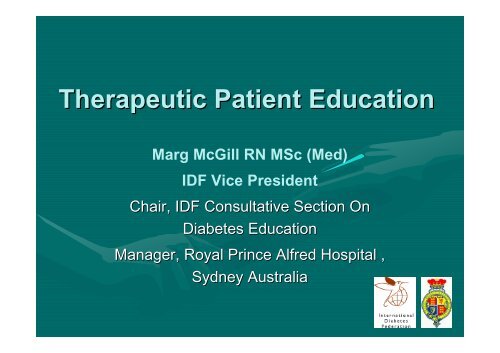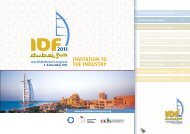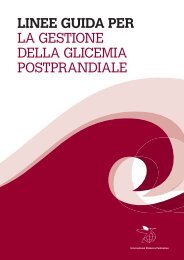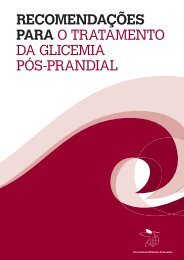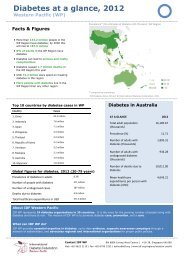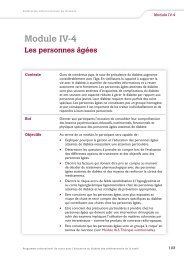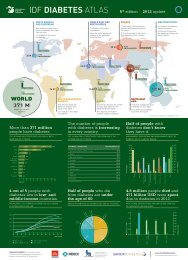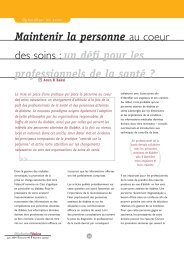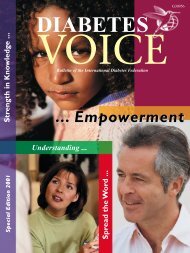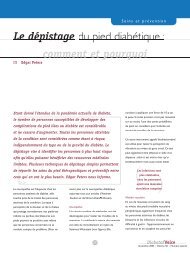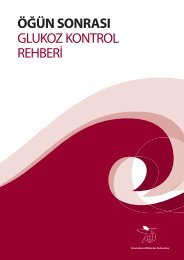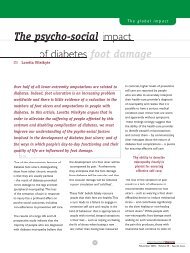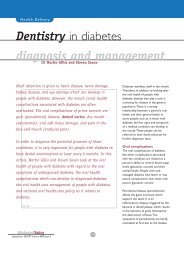Therapeutic Patient Education
Therapeutic Patient Education
Therapeutic Patient Education
Create successful ePaper yourself
Turn your PDF publications into a flip-book with our unique Google optimized e-Paper software.
<strong>Therapeutic</strong> <strong>Patient</strong> <strong>Education</strong><br />
Marg McGill RN MSc (Med)<br />
IDF Vice President<br />
Chair, IDF Consultative Section On<br />
Diabetes <strong>Education</strong><br />
Manager, Royal Prince Alfred Hospital ,<br />
Sydney Australia
The Burden Of Diabetes
Too Many <strong>Patient</strong>s for Number of Staff<br />
• Keep working in the “old way”<br />
• High patient throughput ---> > poor quality care<br />
• Blood glucose focus rather than comprehensive<br />
care<br />
• Information focus rather than motivation and<br />
behaviour change<br />
• Staff burnout and high turnover
Sharing The Burden – Pulling Together
“Helping others is good, teaching<br />
them to help themselves is better”<br />
George Orwell
Why Is <strong>Patient</strong> <strong>Education</strong> So Important?<br />
1. It improves quality of life<br />
2. People want information<br />
3. Chronic disease and lifestyle related illnesses are<br />
common<br />
4. Health education helps us use resources more<br />
efficiently
The Role Of The Educator<br />
• The diabetes educator promotes<br />
– self care<br />
– self responsibility<br />
– informed decision making<br />
• through information and behaviour change<br />
strategies
Staff Selection<br />
• Select Staff Who:<br />
– Intelligent, non-judgemental and flexible<br />
– Keen to Go Beyond Traditional Training and Role<br />
– If educator has diabetes need to respect others’<br />
ways of coping with their diabetes
Skills Needed<br />
• An effective educator :<br />
– Patience and Commitment<br />
– Knows principles of diabetes management<br />
– The education process<br />
– Good communicator<br />
– Presentation skills<br />
– Writing skills<br />
– Counselling/interviewing
Educating the Educator<br />
• “Think outside the square you live<br />
in”, have an open mind and learn<br />
from<br />
– Advertising/Marketing<br />
– Negotiators<br />
– Media presenters<br />
– PATIENTS
Myths About <strong>Education</strong><br />
• <strong>Education</strong> is a process of giving people information<br />
and telling them what to do<br />
• If people come to see you, they want to learn or<br />
change<br />
• Knowledge changes behaviour
Knowledge to Behaviour Change<br />
• “you must walk every day”<br />
• this is NOT diabetes education …….rather<br />
• help patient consider strategies that allow them to<br />
integrate exercise into their day<br />
– Use pedometer to motivate
Case Study 1<br />
New <strong>Patient</strong> Clinic<br />
• Mr Mankov, , newly diagnosed type 2, overweight<br />
– Smoker<br />
– Ischaemic heart disease<br />
– Hba1c 11.1%<br />
– ↑ Serum cholesterol<br />
– ↑ Blood pressure
Case Study 1 - Strategies<br />
• Select most important issue<br />
• Address one at a time<br />
• Use high dosage medication
Designing A Diabetes <strong>Education</strong> Program<br />
• Assess<br />
• Plan<br />
• Implement<br />
• Evaluate
Content for <strong>Education</strong> Program<br />
life Content Life Content
Assess, , Plan, Implement, Evaluate<br />
• Why?<br />
– Establish rapport and trust with the person<br />
– Determines what the role for family will be<br />
– Identifies barriers to learning<br />
– Encourages participation
Do We Know What Our <strong>Patient</strong>’s Want?<br />
• A significant difference exists among the problems<br />
identified by the patient and those identified by the<br />
caregiver.<br />
Genev, 1992, Woodcock & Kinmonth, 2001
Assess, , Plan, Implement, Evaluate<br />
• Goals of assessment<br />
– find out the person’s most pressing concerns<br />
– prior knowledge<br />
– current status of disease<br />
– current self-care practices<br />
– determine cultural and health beliefs
Assess, , Plan, Implement, Evaluate<br />
• Vital information<br />
– what information does the person need to be<br />
safe?<br />
– what skills does the person need to perform?<br />
– May call these ‘survival skills’
Communication<br />
• Words 7%<br />
• Verbal<br />
– Tone, volume etc 38%<br />
• Non-verbal<br />
55%<br />
– Facial expression,<br />
– Eye contact,<br />
– Gestures and posture<br />
– Physical contact<br />
– Appearance
Tips for Plain Speaking<br />
• Use simple non-medical language<br />
• it’s not “clever” or “more intelligent” to use words<br />
people cannot understand
Assess, Plan, , Implement, Evaluate<br />
• Develop with the person with diabetes<br />
– what do you want to know?<br />
– what must you know?<br />
• Offer choices<br />
– individual<br />
– classes<br />
• Write objectives or goals together
Assess, Plan, Implement, Evaluate<br />
• Communication is the key<br />
– simple words<br />
– open ended questions<br />
– encourage feedback<br />
– give positive feedback<br />
– attitude<br />
– listen, listen<br />
– repetition
Assess, Plan, Implement, , Evaluate<br />
• Determine priorities from the objectives<br />
– begin with what the learner wants to know<br />
– most important first and last<br />
• Conducive environment<br />
• Move from simple to complex<br />
• Be specific<br />
• Repeat, repeat, repeat<br />
– <strong>Patient</strong>s only recall 25% of a 20 minute<br />
consultation
I Need Resources!<br />
• All you need is good understanding of diabetes,<br />
your voice, your ears and a kind heart
Developing Written Resources<br />
• Often too high a literacy level<br />
• Tabloid newspaper (~ 11years)<br />
• Short sentences<br />
• Use informal language<br />
• Meaningful pictures
Original Text<br />
One of the vital aspects of<br />
your care is the adherence to<br />
a dietary regimen. Each<br />
patients dietary prescription<br />
varies, depending on the<br />
degree of obesity and<br />
hyperglycaemia.<br />
Accommodations to your<br />
eating habits will be of prime<br />
importance as adherence to<br />
dietary management will<br />
enhance your overall quality<br />
of life.<br />
Rewritten Text<br />
Your diet is an important<br />
part of your care.<br />
Everyone is different so<br />
your diet will need to be<br />
planned just for you.<br />
Following your diet is one<br />
way of helping you feel<br />
well.
What Can I Eat?<br />
• Carbohydrate counting/exchange system confusing<br />
Deck of cards = 1 serving<br />
of meat, poultry of fish<br />
Tennis ball = 1 medium<br />
size vegetable or fruit
The Hand Method<br />
• Hand is proportional to the size of the person<br />
Thumb-tip = teaspoon<br />
2 thumbs=serving of cheese<br />
Palm=serving of meat,chicken or poultry<br />
Fist = cup
What Are The Different<br />
Strategies/Formats For <strong>Patient</strong><br />
<strong>Education</strong>?
Individual Instruction<br />
• Advantages<br />
– personalized<br />
– based on needs<br />
– actively involves the<br />
learner<br />
– allows for personalized<br />
goal setting<br />
– allows for questioning<br />
and ongoing evaluation<br />
• Disadvantages<br />
– no opportunity to share<br />
with others<br />
– educator runs the risk of<br />
teaching too much<br />
– ?? more costly
Watch your body language
Group Instruction<br />
• Advantages<br />
– opportunity to share<br />
– cost effective<br />
– members gain support<br />
from each other<br />
• Disadvantages<br />
– need a skilled facilitator<br />
to keep things on track<br />
– some may not be<br />
comfortable speaking up<br />
in a group<br />
– some people do not<br />
participate actively<br />
– some topics may be too<br />
sensitive to discuss in a<br />
group
Watch Your Body Language!<br />
• “avoid looking like a school teacher”
Lecture<br />
• Advantages<br />
– learners have some<br />
opportunity to share<br />
– teacher has control of<br />
material discussed<br />
– cost effective??<br />
• Disadvantages<br />
– minimal exchange<br />
between students<br />
– not tailored to the<br />
individual<br />
– passive learning<br />
experience
• Works in all cultures<br />
Use Role Play
Use Drawing/Art
Targeting <strong>Education</strong><br />
• Do not mix type 1 and type 2<br />
• Special groups<br />
– children …look at how schools divide them into<br />
infant, primary, high, college/university<br />
– Elderly...targets may be modified,<br />
• Not everyone requires the same level of education<br />
– “take your tablets every day, walk around the<br />
block and come and see me in 3 months”<br />
– footcare education,
Footcare <strong>Education</strong><br />
• Low Risk<br />
– Simple advice<br />
– No change in lifestyle<br />
– Annual foot assessment<br />
• High Risk<br />
– Intensive education,<br />
– Practical demonstration<br />
– Significant behaviour changes<br />
– Concentrate on precipitating events<br />
• Shoes cause 58% of ulceration
Evaluate the Outcome<br />
• Concerned with measurement of :<br />
– patient performance<br />
– educator effectiveness<br />
– quality of programme
Evaluating <strong>Education</strong><br />
• Do not test knowledge only<br />
– eg You should check your shoes everyday<br />
– yes<br />
no<br />
• Test behaviour change<br />
– How many days in the last 7 did you check your<br />
shoes<br />
– 1 2 3 4 5 6 7
Other Evaluation Processes<br />
• Ask patient about educators performance<br />
• Skill demonstration<br />
• Videotape session<br />
• Have an observer<br />
– watch body language<br />
– chart communication flow<br />
• Note the number and type of questions asked
Summary<br />
• Select the best person for the job<br />
• Do needs assessment<br />
• Plan your program<br />
• Target education to patient’s needs<br />
• Use interactive, cooperative teaching style<br />
• Provide good learning environment<br />
– Avoid being judgmental and creating guilt<br />
Don’t overload the patient with information<br />
• Evaluate
Be Brave And Try New Things


